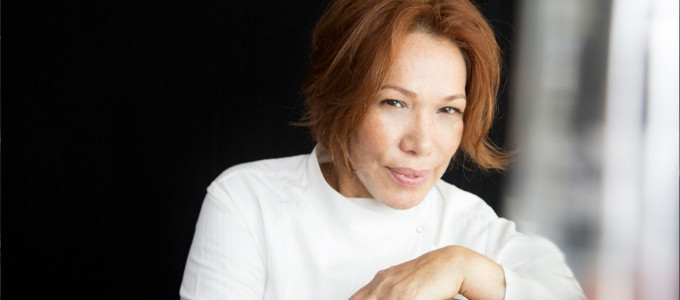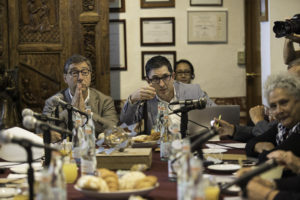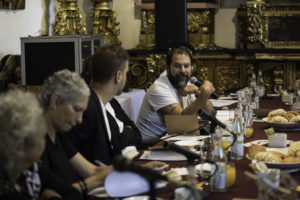COLOMBIAN CHEF LEONOR ESPINOSA WINS THE BASQUE CULINARY WORLD PRIZE 2017
Monday 17 July 2017
Announced 18.00 Mexico City/ 01.00 San Sebastian/ 00.00 (Midnight) London/ 19.00 New York
 At an event in Mexico City, Colombian chef Leonor Espinosa was today named as winner of the Basque Culinary World Prize 2017, an award for chefs around the world whose projects have improved society through gastronomy.
At an event in Mexico City, Colombian chef Leonor Espinosa was today named as winner of the Basque Culinary World Prize 2017, an award for chefs around the world whose projects have improved society through gastronomy.
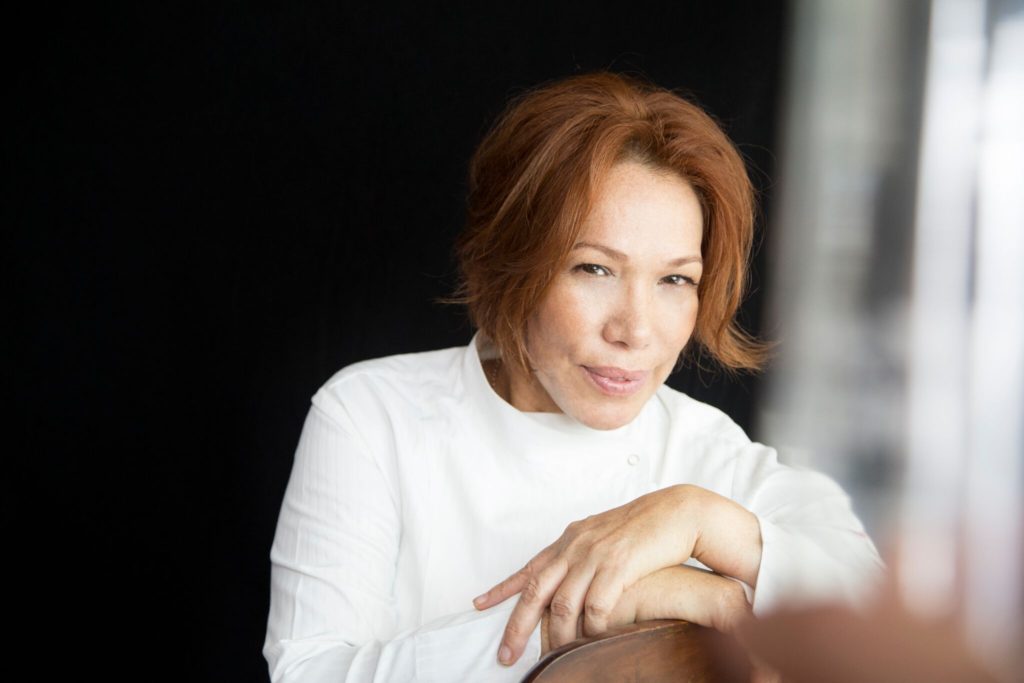 Leonor Espinosa, one of Colombia’s most celebrated chefs and a key figure in its gastronomic renaissance, has nurtured and promoted the value of the country’s biodiversity. Through the Funleo foundation, Leonor Espinosa has revived the ancestral knowledge and know-how of mainly indigenous and Afro-Colombian peoples. She supports rural development based on food sovereignty, and promotes routes to market for small producers as well as spaces for education, nutrition, enterprise and tourism. She helped build support for the establishment of a Comprehensive Gastronomy Centre in Golfo de Tribugá as an alternative framework to drug trafficking, and has campaigned to raise awareness of Colombia’s culinary richness. Leonor Espinosa’s work has encouraged communities to turn their biological and cultural heritage into tools for socio-economic development. (longer biography in notes to editors)
Leonor Espinosa, one of Colombia’s most celebrated chefs and a key figure in its gastronomic renaissance, has nurtured and promoted the value of the country’s biodiversity. Through the Funleo foundation, Leonor Espinosa has revived the ancestral knowledge and know-how of mainly indigenous and Afro-Colombian peoples. She supports rural development based on food sovereignty, and promotes routes to market for small producers as well as spaces for education, nutrition, enterprise and tourism. She helped build support for the establishment of a Comprehensive Gastronomy Centre in Golfo de Tribugá as an alternative framework to drug trafficking, and has campaigned to raise awareness of Colombia’s culinary richness. Leonor Espinosa’s work has encouraged communities to turn their biological and cultural heritage into tools for socio-economic development. (longer biography in notes to editors)
Leonor Espinosa was chosen as winner of the Basque Culinary World Prize from a final Top 10 by a Prize Jury of the world’s most respected chefs and experts in other fields, and announced today at the El Claustro de Sor Juana, a culinary school in Mexico City. Mexico was chosen as the location for the prize announcement because it expresses the wealth and potential of Latin American gastronomy as well as the challenges facing contemporary cuisine.
The Basque Culinary World Prize is organized and promoted by the Basque Government under the Euskadi-Basque Country Strategy and the Basque Culinary Center (BCC), a world leading academic institution in gastronomy. The winner will be awarded €100,000 to devote to a project or institution of their choice that demonstrates the wider role of gastronomy in society. In 2016, the prize went to María Fernanda Di Giacobbe, who won for her Cacao de Origen project in Venezuela.
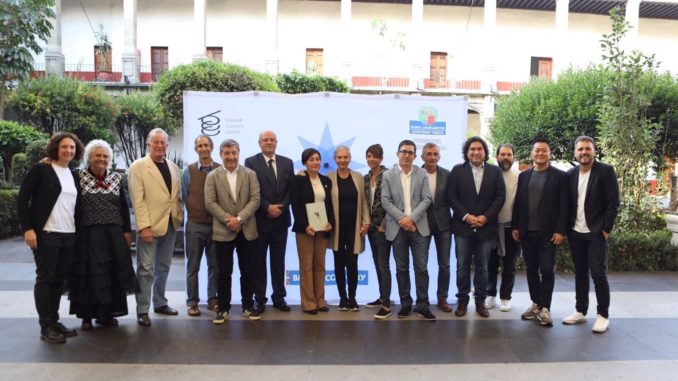
The Prize Jury was chaired by Joan Roca, (Spain) and included Gastón Acurio (Peru), Michel Bras (France), Dominique Crenn (US) Yoshihiro Narisawa, (Japan) and Enrique Olvera (Mexico). International experts in other disciplines joined them including novelist Laura Esquivel, author of the hugely popular novel Like Water for Chocolate; Kirmen Uribe, one of the most widely read and translated Basque language authors; Cristina Franchini, an expert on International Law; Matthew Goldfarb, organic farmer, rural sociologist and expert in sustainable production; and María Fernanda di Giacobbe, winner of the 2016 Basque Culinary World Prize.
The 10 finalists chefs who were under consideration for the prize included José Andrés (US); Ebru Baybara Demir (Turkey); Leonor Espinosa (Colombia); Dan Giusti (US); David Hertz, (Brazil) Anthony Myint (US); Daniel Patterson and Roy Choi (US); Melinda McRostie (Australia/Greece); Niko Romito (Italy); Ricardo Muñoz Zurita: Mexico. (Further details in Notes to Editors).
These chefs have focused on everything from innovation to education, health, research, sustainability, social entrepreneurship and philanthropy, and the preservation of local cultures. They are building on the work of a pioneering group that started this movement “beyond the kitchen”, which include Gaston Acurio, Dan Barber, Heston Blumenthal, Massimo Bottura, Claus Mayer, Jamie Oliver, Rene Redzepi and Alice Waters.
On winning the Basque Culinary World Prize, Leonor Espinosa said:
“The award shine a light on those communities that for years have struggled to be recognized for their ancestral value and their contribution to national cultural identity. It is a way to mitigate the silence generated by armed conflict, injustice and exclusion. In this process of reconciliation, the country is beginning to understand the importance of placing faith in gastronomy as a significant tool for the economic development of those populations where the real wealth that generates wealth is found”
Joan Roca, Chair of the Prize Jury, said:
“As the jury, we believe that through awarding the prize to Leonor we recognise all those people who are working hard today so the city and rural communities can come together though gastronomy. Leonor’s work shows the possibilities that come when chefs acknowledge that biodiversity, ecology, culture, and the traditions of local communities matter. Her work gives voice to the silence and anonymity of indigenous and Afroamerican cultures. We found this inspiring and powerful”
Bittor Oroz, Deputy Minister of Agriculture, Fisheries and Food Policy in the Basque Government, said:
“The characteristics that are associated with gastronomy in the Basque Country are a reflection of what we want to be and the values we want to project in the world as the Euskadi Basque Country. A country whose hallmarks are innovation, entrepreneurship, tradition and know-how, and, of course, quality products.”
Joxe Mari Aizega, Director General of the Basque Culinary Centre, said:
“Through the prize we wanted to share inspiring testimonies of how gastronomy can help improve society. The winner is a tangible example of this – of the sense of responsibility that being a chef can involve nowadays. Leonor Espinosa provides an inspirational story for the industry that we are extremely excited to share”
Entries for the Basque Culinary World Prize 2017 came from 30 countries worldwide, and a total of 110 chefs were nominated. To be considered for the award, chefs had to be nominated by another professional currently working in the world of gastronomy – for instance, another chef, food writer or food supplier, or an institution.
For two months, professionals and institutions within the profession nominated chefs from anywhere in the world who demonstrated how gastronomy could become a transformational force in areas ranging from innovation to education, health, research, sustainability, social entrepreneurship and philanthropy, and the preservation of local cultures.
The ten shortlisted chefs were chosen by a technical committee chaired by chef Elena Arzak, head chef at Arzak, the renowned 3-Michelin starred restaurant, who met last month in San Sebastian. The committee included an international group of academics with expertise in various aspects of food culture and gastronomy such as Joxe Mari Aizega, General Manager of Basque Culinary Center; Jorge Ruiz Carrascal, Professor of the Department of Food Science at the University of Copenhagen; Marta Miguel Castro, a Research Associate at the CIAL Institute of Research in Food Science, who studies how food components could prevent disorders such as diabetes and obesity; Melina Shannon Dipietro, executive director of Rene Redzepi’s MAD project; and Dr F. Xavier Medina, author, social anthropologist and leading scholar of Food and Culture at the Universitat Oberta de Catalunya (UOC) in Barcelona.



